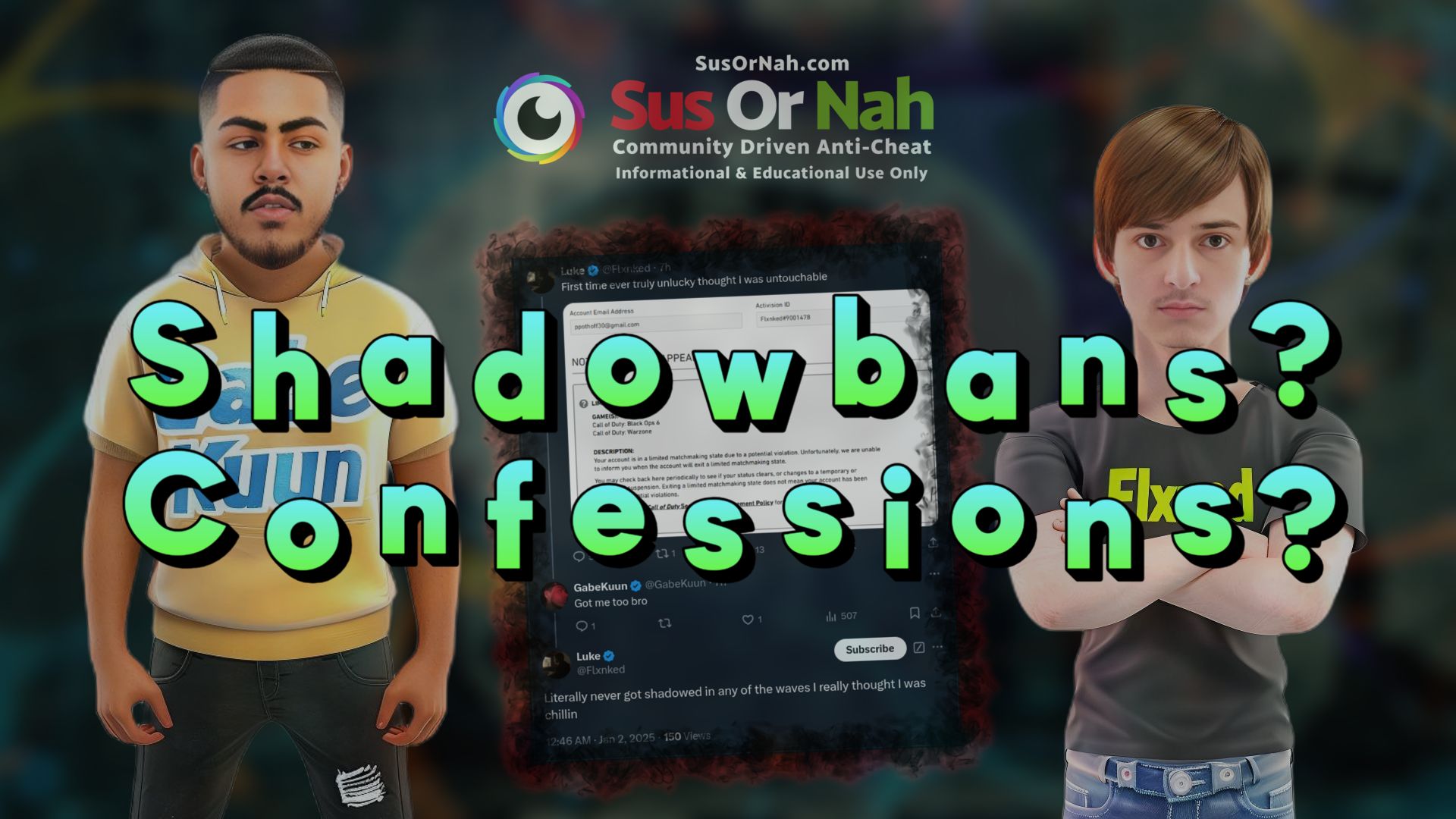
Two cryptic tweets from up and coming “prominent” players Luke (@Flxnked) and Gabe Kuun (@GabeKuun) have left the Call of Duty (COD) community grappling with more questions than answers. The tweets, vague yet suggestive, have sparked a quiet storm of speculation, with many wondering if they’ve just witnessed an indirect admission of cheating.
It all started with a single tweet from Luke:
“First time ever truly unlucky thought I was untouchable.”
At first glance, it could easily be dismissed as a frustrated player venting about a bad match or an unlucky streak. But then came the reply from Gabe Kuun:
“Got me too bro.”
The exchange took on a darker tone when Luke followed up with another post, stating:
“Literally never got shadowed in any of the waves I really thought I was chillin.”
For the uninitiated, a “shadowban” in Call of Duty is no small matter. It’s a system designed to isolate suspicious players by placing them in restricted matchmaking pools while their accounts are reviewed for potential cheating. The mention of shadowbans in this context caught the attention of the COD community, sparking curiosity and speculation about whether there was more to the story than just an unlucky moment.
In an alarming twist following the cryptic tweets by Luke (@Flxnked), a subsequent post made hours later raises serious concerns about a direct violation of Activision's Call of Duty Security and Enforcement Policy. Luke tweeted:
“Any snd to play or does anyone want their ranked account boosted for $$$ lmk”
This message openly suggests account boosting for monetary compensation, a clear breach of Activision's Terms of Service and Security and Enforcement Policy. According to the policy:
Boosting
“Any user who colludes with another user to exploit the game for the purpose of gaining XP, prestige, game score, weapon level, or in-game unlock is subject to penalty.”
By offering account boosting services for money and whilst banned, Luke not only violates the Security Policy but also risks permanent suspension of his account across all linked devices. His tweet undermines the competitive integrity of Call of Duty, as boosting disrupts fair play and compromises the experience of legitimate players.
While no one directly responded to their tweets, that doesn’t mean the gaming world hasn’t noticed. Players are piecing together the puzzle, speculating on what these tweets might mean.
Could this be a confession? Was Luke admitting that he had avoided detection in previous waves of shadow bans? Gabe’s response only added fuel to the fire, implying that both players had been hit with the same consequence at the same time.
One could almost hear the unspoken conversations echoing in the minds of fans:
“Wait a second—why would they even bring up shadowbans unless there’s something shady going on?”
“They’re not directly saying they cheated, but why else would they think they were ‘untouchable’ or ‘chillin’?”
“If this isn’t an admission, then what is it? A joke? A misunderstanding? Or something worse?”
Without further clarification from Luke or Gabe, the lack of responses from their followers feels almost eerie. It’s as if the community is collectively holding its breath, waiting for someone—anyone—to confirm or deny what these tweets are really about.
Even in the absence of direct accusations, the implications of these tweets are heavy. The Call of Duty community has long struggled with the issue of cheating, particularly in competitive settings. Hacks, exploits, and unauthorized software have plagued the game, leading to widespread frustration among players who simply want a fair experience.
The mention of shadowbans, especially from two “high-profile” figures in the community, hits a nerve. These aren’t random players casually discussing the mechanics of the game. These are influencers—players with a platform and a following, whose actions and words carry significant weight.
For many, the idea of “prominent” players cheating is not just disappointing—it’s infuriating. Competitive gaming relies on trust: trust in the system, trust in the developers, and trust in the players themselves. When that trust is broken, it threatens the integrity of the entire community.
This silence only deepens the mystery. Are the tweets a joke? A veiled confession? Or just a “poorly-worded way” of discussing a “frustrating” game mechanic?
For now, the COD community can do little but speculate. Theories are bouncing around in hushed conversations, each more compelling than the last:
What makes this situation even more unsettling is the lack of direct community response. No replies, no public outrage, no immediate callouts. It’s as if everyone is watching from the sidelines, waiting for more information before deciding how to react.
But in a way, this silence speaks volumes. It suggests a community that’s wary—perhaps even exhausted—by the constant battle against cheating. The idea that two well-known players might have been caught up in this issue is too big to ignore, but also too delicate to address without concrete proof.
If the tweets are indeed a confession, they could spark a much larger conversation about the effectiveness of Activision’s anti-cheat measures and the prevalence of cheating in the game.
On the other hand, if this is all a misunderstanding… In a world where cheating accusations are thrown around so casually, even the slightest suggestion of wrongdoing can snowball into a full-blown controversy.
For now, the mystery remains unsolved. But one thing is certain: the community is watching, waiting, and wondering.